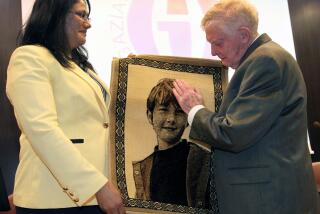Boy Loses Long Battle to Live
- Share via
John and Alicia Bennett knew they would probably bury their three children, all stricken with a rare genetic disease.
They never imagined they would lose Tommy first.
Four-year-old Tommy, the youngest and healthiest -- the one strong enough to endure three experimental stem-cell transplants -- succumbed early Tuesday to complications of the procedures intended to save his life.
“I told him that it was all right for him to go,” Alicia Bennett wrote in an e-mail to a reporter Tuesday. “I will miss him so much, but I will be waiting to see him again, dancing on his tippy toes in my dreams.”
The struggle of the Ione, Calif., family against Sanfilippo syndrome -- painstakingly chronicled by Tommy’s mother in an online journal -- captured the interest of strangers from around the country and abroad. Tommy’s death at Duke University Medical Center in North Carolina brought condolences and expressions of grief from more than 150 people in 26 states and six countries.
“Because of Tommy, people prayed,” wrote a woman from Galt, Calif., in a guest book on the family’s Web site. “Because of Tommy, people reevaluated their own lives. Because of Tommy, people gave. A pretty amazing feat for a 4-year-old little boy.”
With Thanksgiving days away, writers praised Tommy’s gift to them.
“I am so thankful that you shared Tommy,” wrote one woman from Saugus. “I along with thousands and thousands of others grieve today.... I have three children of my own, yet through you allowing us into your life I have learned to love at a different level.”
A woman from Leigh in the United Kingdom also weighed in: “My heart is so broken.... Tommy, I bet you are a beautiful angel!!”
In her e-mail, Alicia Bennett described Tommy’s last hours, including her final words to him as she held him in bed.
“I told him how proud I am of him and of how hard he fought,” she wrote. “I told him that he has helped so many children and he is an amazing little boy [who] opened so many doors for so many children.
“God gave him to us for a reason, and I think that Tommy fulfilled his destiny.”
The Bennett family, whose story has been followed by The Times for more than a year, lost the genetic lottery. All three of their children were born with Sanfilippo -- a syndrome afflicting one in 70,000 children in which an enzyme needed to break down chains of sugar molecules is lacking. Over time, these molecules are stored in cells and begin to build up, causing progressive organ damage. As with many rare diseases, it doesn’t generate much interest from researchers or drug companies.
Children with the disease become progressively disabled and are likely to die before their early teens.
The Bennetts did not find out that their eldest, Ciara, now 7, had the condition until after they had Hunter, 5, and Tommy.
The search for a cure uprooted their lives, sending them on a transcontinental journey to Duke University, where a researcher Alicia Bennett heard about was conducting experimental treatments. Their quest also pitted them against their health maintenance organization -- Kaiser Permanente -- which initially refused to cover the procedure, saying that it was risky and that there was no evidence it would work.
Under public pressure -- inspired partly by the family’s appearance on NBC’s “Today” show -- Kaiser agreed to donate $1 million to Duke, effectively covering the costs of Tommy’s initial treatment. Duke agreed to pick up subsequent medical costs. Other donors -- organizations and individuals -- raised more than $100,000.
Even so, the family’s 14-month stay at Duke ruined them financially. John Bennett took time off from his job as a trucker and struggled to meet the costs of housing, transportation and food for the family.
The family was split up, sometimes for months on end. Ciara and Hunter were deemed too disabled even to try the stem-cell procedure. Tommy, still vivacious at 3, was the only candidate well enough to benefit from the transplant and strong enough to withstand its risks.
John and the two eldest children repeatedly shuttled back and forth between Ione and Durham while Alicia stayed with her youngest.
Tommy underwent his first transplant a year ago this week after taking screening tests on his third birthday. The procedure, if successful, replaces defective cells with healthy ones and provides the enzyme that Sanfilippo patients lack.
Twice, the procedure didn’t take for Tommy. But the third transplant, in September, appeared to be working, and Tommy’s body began producing the missing enzyme.
Meanwhile, his older sister and brother grew worse. Ciara began to sleep most of the day and would cry when awake, requiring heavy pain medicine; she couldn’t communicate. Hunter couldn’t talk, and his behavior at times became uncontrollable.
In recent weeks, Tommy also took a turn for the worse -- not because of the syndrome but because of complications from its treatment.
Over the weekend, as his organs shut down, doctors predicted the worst. But his parents, typically stoic, held out hope.
“I thought he’d pull it out, even the last few days,” his father said in an interview Tuesday. “Bad things kept happening and he kept pulling out of them.”
The day of Tommy’s death, John Bennett’s only solace was his son’s far-reaching influence. “I think Tommy touched more people in his little four years than most people ever will,” he said.
The Bennetts will return to California today to rejoin their two other children, who have been staying with John’s parents in Pine Grove near their own home in Amador County.
At Duke, Dr. Joanne Kurtzberg, the researcher in charge of Tommy’s care, vowed to continue trying to help Sanfilippo children.
“Otherwise, they will all die a terrible death,” she said in an e-mail to The Times.
Including Tommy, five of the 11 children with Sanfilippo who have undergone the transplant have died from complications. That’s a higher figure than the 20% fatality rate predicted by Duke researchers before Tommy’s procedure.
Kurtzberg said Tuesday that she doesn’t know what killed Tommy -- whether he contracted a virus, whether his transplanted stem cells attacked his body or whether his organs were irreparably poisoned by the chemotherapy. She said it was possible that he died from a combination of the three factors.
“While we are all devastated by Tommy’s death, we must not give up,” Kurtzberg wrote in her e-mail. “We have to continue to find ways to diagnose and treat these children earlier in life -- before the disease has caused irreversible damage to their brains.... Tommy’s dignity and courage in life and memory in death stimulates us to go on.”
The Bennetts agreed Tuesday to donate Tommy’s brain to research so that experts can help determine “how, why and what causes this horrible disease,” Alicia Bennett said in her e-mail.
“Tommy is my hero, and he has and will give so many other Sanfilippo children a chance that Ciara and Hunter didn’t have,” she wrote. “And now, his brain will also help other kids.”
Looking back, John Bennett said he doesn’t regret taking a risk on the stem-cell procedure.
“He was so full of life,” he said, choking up. “I think he deserved a chance.... I think he would have wanted that chance.”
Donations to the Bennetts, payable to Tommy Bennett, can be sent to Alyssa Boreiko-Bank of America, 100 Rock Spring Court, Carrboro, NC 27510.
Alicia Bennett’s journal can be found at www.caringbridge .com/ca/bennettboys.
Previous Times stories on the family can be found at latimes.com/bennett.
More to Read
Sign up for Essential California
The most important California stories and recommendations in your inbox every morning.
You may occasionally receive promotional content from the Los Angeles Times.









